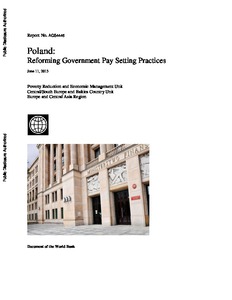Poland - Reforming government pay setting
"This 'Reforming Government Pay Setting Practices' report is a response to a request from the Polish Ministry of Finance (MOF) for technical advice on Poland's system of public sector pay. The Ministry's primary aim is to contain the public sector wage bill as part of an ove...
| Main Authors: | , , |
|---|---|
| Institution: | ETUI-European Trade Union Institute |
| Format: | TEXT |
| Language: | English |
| Published: |
Washington, DC
2013
World Bank |
| Subjects: | |
| Online Access: | https://www.labourline.org/KENTIKA-19126058124919442309-Poland---Reforming-government-.htm |
| Summary: | "This 'Reforming Government Pay Setting Practices' report is a response to a request from the Polish Ministry of Finance (MOF) for technical advice on Poland's system of public sector pay. The Ministry's primary aim is to contain the public sector wage bill as part of an overall effort to reduce the fiscal deficit. But the Ministry is also concerned with more fundamental structural issues in the system of pay setting: that individual pay levels for some positions may be higher than is necessary to attract and retain qualified staff and, in other cases, may be too low. And that the absence of clear rules for job grading, pay setting, and promotion may undermine staff morale. This initial report looks only at a subset of public employees-the so-called budget sphere. This includes all staff paid from the central government budget-including central government civil servants and military personnel-but excludes staff paid by local governments. These include the majority of teachers and medical personnel. A more detailed analysis of the wage setting process looks at a subset of the budget sphere: only civil servants. Note that the decision to focus on the civil service was dictated by the resource constraints of this study and the scarcity of data on public employment outside the civil service. It does not imply that problems in the civil service are more severe than elsewhere in the public sector. The report focuses on three questions: (i) does the system succeed in controlling the aggregate wage bill? (ii) Are salaries high enough to attract and retain qualified staff? And (iii) Is wage setting fair? Does it motivate staff? " |
|---|---|
| Physical Description: | 32 p. Digital |

